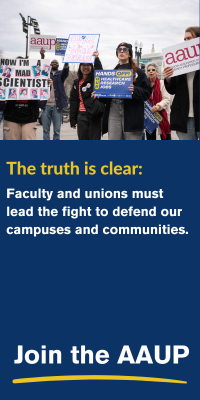- About
- Programs
- Issues
- Academic Freedom
- Political Attacks on Higher Education
- Resources on Collective Bargaining
- Shared Governance
- Campus Protests
- Faculty Compensation
- Racial Justice
- Diversity in Higher Ed
- Financial Crisis
- Privatization and OPMs
- Contingent Faculty Positions
- Tenure
- Workplace Issues
- Gender and Sexuality in Higher Ed
- Targeted Harassment
- Intellectual Property & Copyright
- Civility
- The Family and Medical Leave Act
- Pregnancy in the Academy
- Publications
- Data
- News
- Membership
- Chapters
Student Debt Update
The expectation that students will incur debt to finance higher education is a major barrier to equity and access. Through our New Deal for Higher Education campaign, the AAUP and the AFT have pushed for allowing all students to gain access to higher education regardless of their ability to pay. Over the past year, we have seen movement on this issue in two areas: reforms to the Public Service Loan Forgiveness (PSLF) program and debt forgiveness.
The PSLF program enables those who work in public service and consistently pay their monthly student loan bills to have the balance of their loans forgiven after ten years. Borrowers have faced rampant servicer misconduct, confusing and sometimes contradictory guidance, and the lack of a clear process for contesting erroneous decisions. Last fall, the Department of Education issued a time-limited waiver for certain requirements of the PSLF program and allows borrowers to receive retroactive credit for past payments that were previously ineligible. While PSLF is a permanent program, the current limited PSLF waiver ends on October 31, 2022. The AAUP has partnered with the AFT to connect members with online clinics on how to obtain debt relief and to offer access to Summer, a loan counseling program.
The Department of Education is also working on more permanent changes to the program. This summer, the AAUP and the AFT submitted joint comments to the department in support of proposed changes to the PSLF program that would remove unnecessary bureaucratic hurdles and make PSLF work better for the borrowers it was intended to help. We also encouraged the department to do far better in providing access to this program for all those who do public service work but are currently excluded from the program based on existing regulations. The comments are available at https://www.aaup.org/sites/default/files/PSLF-Joint-AFT-AAUP-Letter.pdf.
In August, we celebrated as a hard-fought first step the Biden administration’s announcement that up to $20,000 in student debt will be forgiven for borrowers meeting certain guidelines. This forgiveness plan will go a long way toward narrowing the racial wealth gap that the student loan crisis has exacerbated. As AAUP president Irene Mulvey said in response to the administration’s announcement, “The data on student debt make it clear that people of color, especially women of color, are most heavily burdened and deserving of assistance. Four years after graduation, Black college graduates owe nearly twice as much as their white counterparts. For three-quarters of Black borrowers, the student loan balance they owe today is greater than the original balance. It is hard to imagine this kind of injustice going unaddressed if it were directed at a white population.”
The AAUP will continue to push for the comprehensive higher education funding reform that will address the root causes of the student debt crisis and move us toward a more just and equitable society.



